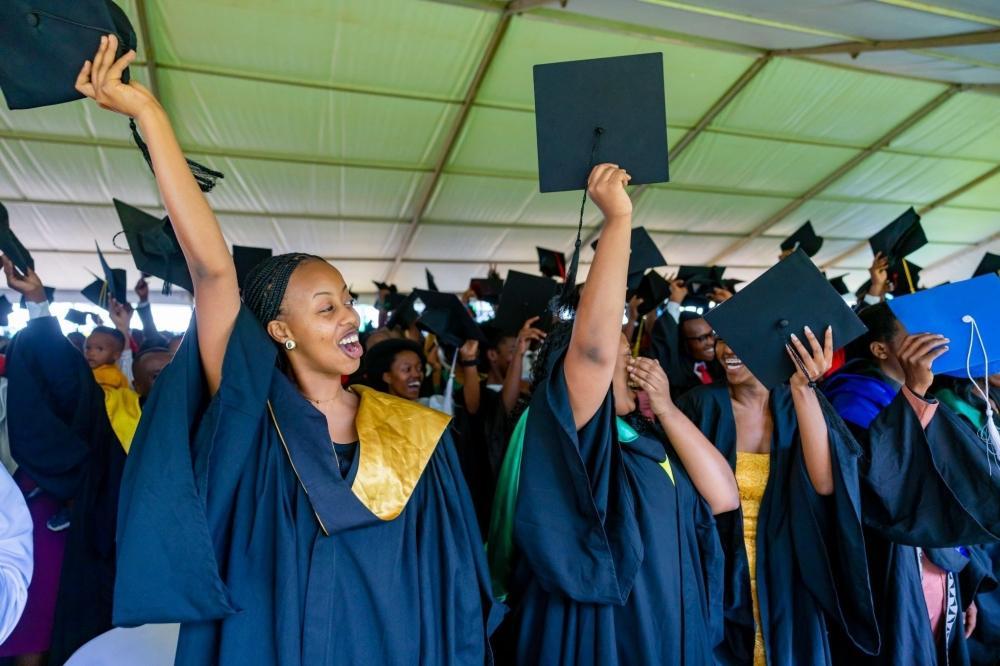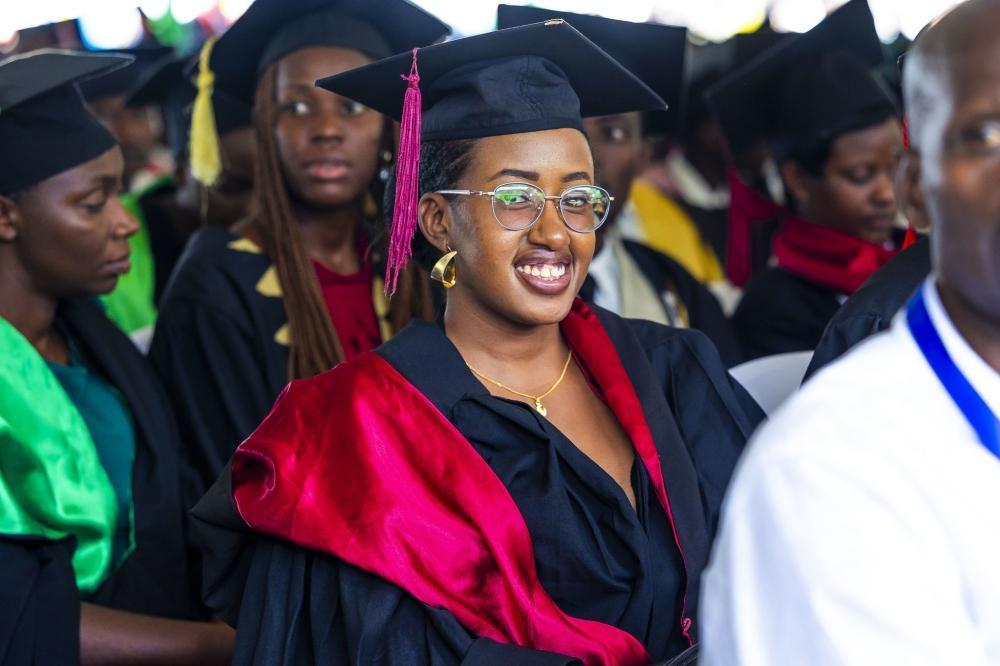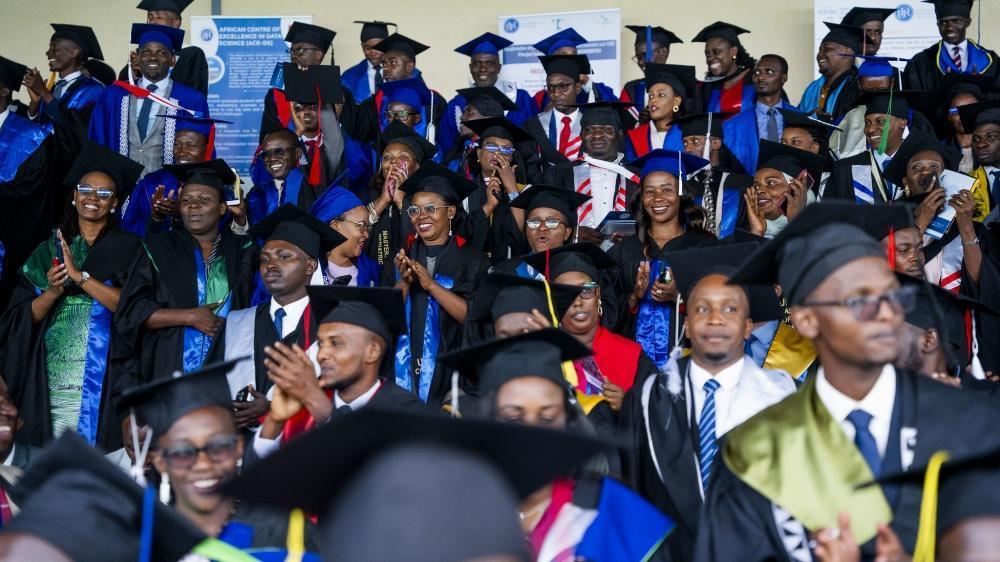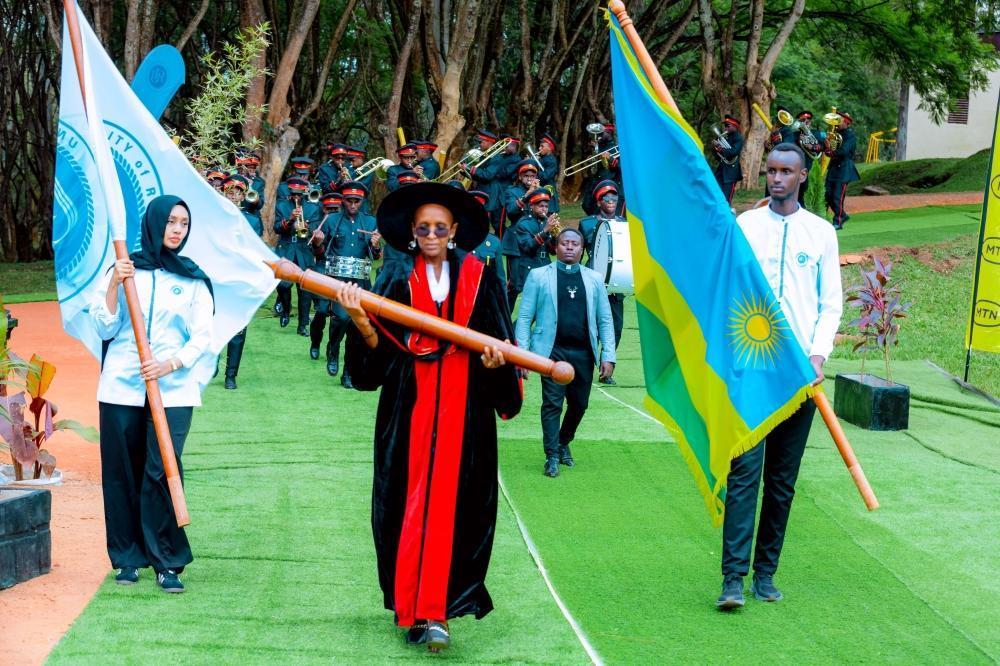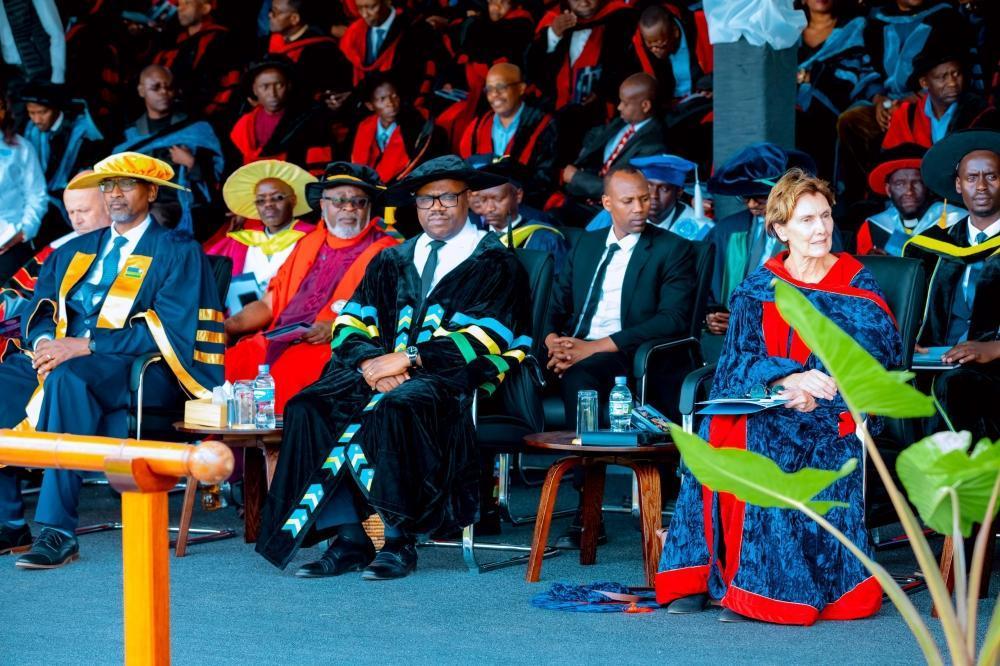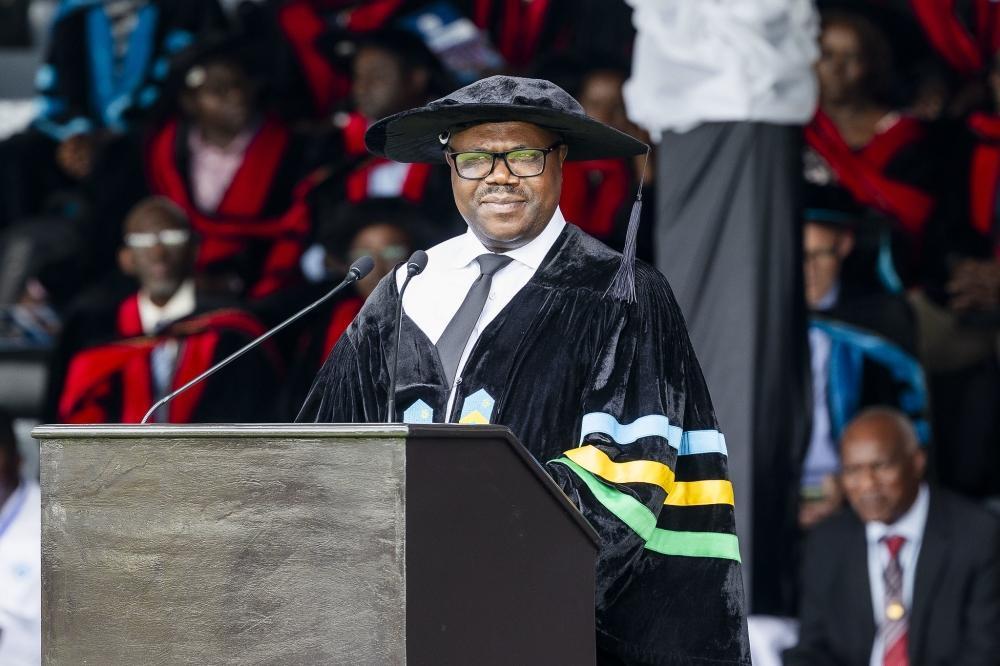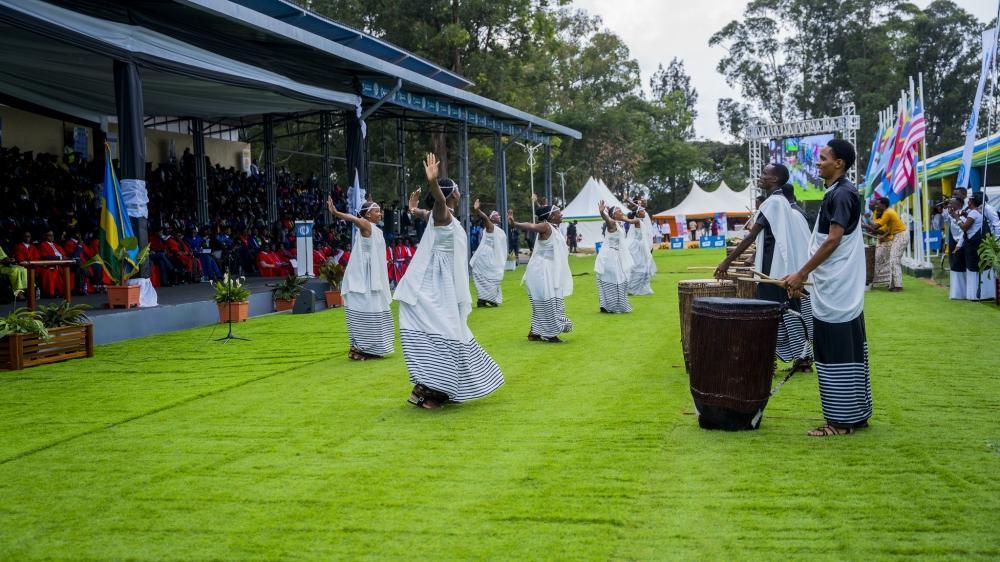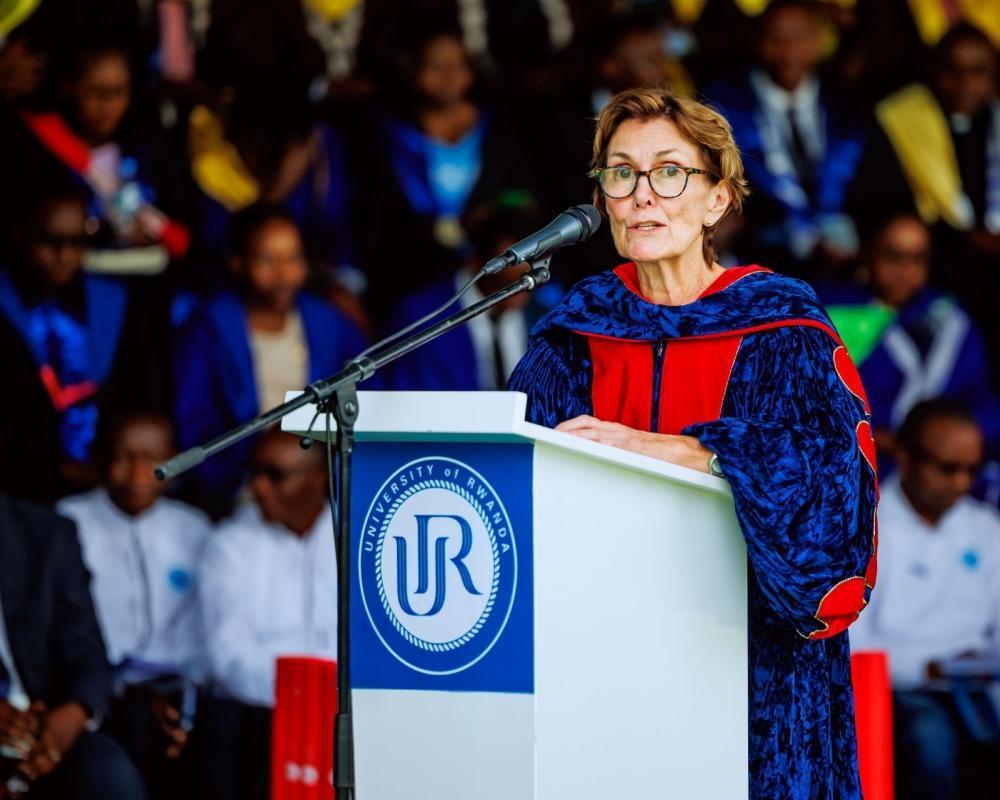Africa-Press – Rwanda. At the University of Rwanda’s 11th graduation ceremony, a total of 9,526 graduates celebrated their academic achievements on Friday, October 17, 2025, comprising 4,204 females and 5,322 males.
The graduates represent various colleges of the University of Rwanda, including 2,554 from the College of Education, 1,688 from the College of Science and Technology, 1,006 from the College of Arts and Social Sciences, 2,005 from the College of Business and Economics, 1,136 from the College of Medicine and Health Sciences, and 981 from the College of Agriculture, Animal Sciences and Veterinary Medicine.
College of Arts and Social Sciences (CASS)
According to UR’s statistics, presented by Dr Alphonse Muleefu, Acting Principal of UR – College of Arts and Social Sciences, 968 candidates (652 males and 316 females) from the College of Arts and Social Sciences are undergraduates, while 38 (30 males and 8 females) are postgraduates.
In the School of Arts and Languages, there are 275 graduates from four programmes.
In the School of Governance, Development and Society, there are 552 graduates from 10 programmes.
In the School of Journalism and Communication, there are 43 candidates from two programmes. In the School of Law, there are 98 candidates from one programme.
The academic awards featured at the ceremony include 52 diplomas, 238 advanced diplomas, 8,462 bachelor’s degrees, 697 master’s degrees, 27 postgraduate certificates, 14 subspecialty certificates, on
Agriculture, Animal Sciences and Veterinary Medicine Colleges
Dr Guillaume Nyagatare, Principal of the former College of Agriculture, Animal Sciences and Veterinary Medicine (CAVM), presented 1,092 graduates with Bachelor’s degrees from the College of Agriculture, Forestry and Food Science (CAFF) and the College of Veterinary Medicine and Animal Sciences (CIVAS).
The College of Veterinary Medicine and Animal Sciences (CIVAS) started in 2024 after restructuring to form the new College of Agriculture, Animal Sciences and Veterinary Medicine (CAVM).
The College of Agriculture, Forestry and Food Science (CAFF) put on the labour market 942 undergraduates (498 males and 444 females), as well as 39 postgraduates (30 males and 9 females).
The College of Agriculture, Animal Sciences and Veterinary Medicine (CAVM) released onto the labour market 150 undergraduates (103 males) and six postgraduates (four males).
These colleges have respective schools: School of Agriculture and Food Science graduated 602 candidates from seven programmes.
School of Agricultural Engineering graduated 141 candidates from two programmes.
School of Forestry, Ecotourism and Landscape Management graduated 199 candidates from two programmes. School of Veterinary Medicine and Life Sciences graduated 64 candidates from one programme. School of Animal Sciences and Biotechnology graduated 86 candidates from one programme.
College of Business and Economics (CBE)
Dr Joseph Nkurunziza, Principal, College of Business and Economics (CBE), presented 1,860 graduates (948 males and 912 females) who obtained Bachelor’s degrees, with the School of Business having 1,223 graduates from nine programmes and the School of Economics having 637 graduates from six programmes.
The college, this year, has 145 postgraduates (82 males and 63 females).
College of Education (CE)
Professor Dr Florien Nsanganwimana, Principal of the College of Education (CE), presented the Chancellor with 2,432 undergraduates (1,289 males and 1,143 females).
Bachelor’s degrees in the School of Education were awarded to 2,085 graduates from 27 programmes, while 27 post-certificates were awarded in one programme.
The college has 122 postgraduates (103 males and 19 females).
Bachelor’s degrees in the School of Inclusive and Special Needs Education were awarded to 297 graduates from four programmes, while Diplomas in the School of Education were awarded to 52 candidates from 14 programmes.
College of Medicine and Health Sciences (CMHS)
Professor Abraham Haileamlak Mitike, Principal of the College of Medicine and Health Sciences (CMHS), presented 906 undergraduates (577 males and 329 females) and 230 postgraduates (115 males and 115 females).
Advanced Diplomas in the School of Health Sciences were awarded to 27 candidates from two programmes.
The School of Nursing and Midwifery has 211 graduates from three programmes. Bachelor’s degrees in the School of Health Sciences were awarded to 190 graduates from six programmes.
The School of Nursing and Midwifery has 174 graduates from two programmes.
The School of Dentistry has 57 graduates from two programmes.
The School of Medicine and Pharmacy has 212 graduates from three programmes, while the School of Public Health has 35 graduates from two programmes.
College of Science and Technology (CST)
Associate Professor Ignace Gatare, Principal of the College of Science and Technology (CST), presented to the Chancellor 1,495 graduates (967 males and 528 females) who obtained Bachelor’s degrees and 193 postgraduates (150 males and 43 females).
The School of Engineering has 414 graduates from 16 programmes. The School of Science has 484 graduates from 12 programmes.
The School of Architecture and the Built Environment has 220 graduates from 10 programmes.
The School of Mining and Geology has 55 graduates from two programmes, while the School of ICT has 322 graduates from six programmes.
Graduates, lecturers, leaders celebrate achievements
Caleb Mitari, a graduates’ representative, said: “This day is not just a ceremony — it marks the peak of a long journey. For us, this has been the goal we have worked towards. We now stand at the beginning of a new future, full of hope and expectation, as proud graduates of this excellent university.”
Among them, 3,978 are females, representing 42 per cent of the total, while 5,548 are males.
“We pledge to become the ethical, creative, and patriotic citizens our country needs to achieve its great goals — to bring innovation to our communities, honesty to our workplaces, and strength to the development of our nation,” he noted.
Clemence Niyitanga, a graduate of statistics, commended the university for setting the highest standards, preparing students to be knowledgeable, creative, and analytical problem solvers.
“The knowledge and skills will help us navigate the labour market. We got enough practices while at university,” she said.
Among the graduates 3,978 are females, representing 42 per cent of the total, while 5,548 are males. Kellya Keza
Pauline Otambo, a pharmacist from Kenya, who graduated with a Master’s Degree in Health Supply Chain Management, described the day as a major milestone.
“Everything has gone perfectly according to schedule. We are truly grateful to the East African Community for supporting this programme, which brought together graduates from Kenya, Uganda, Tanzania, Rwanda, and Burundi. Personally, I’m very thankful to the Government of Rwanda for providing such a supportive environment that allowed us to learn and grow,” she said.
Professor Theoneste Ntakirutimana, the lecturers’ representative, urged the graduates to be the engine of national transformation.
“The University of Rwanda continues to evolve in alignment with our national development aspirations. Our academic and research staff are committed to deepening this alignment through research that informs policy, innovation that drives industry, and community engagement that transforms lives.
Among them, 3,978 are females, representing 42 per cent of the total, while 5,548 are males. Courtesy
“The staff of the University of Rwanda remain deeply committed to advancing Rwanda’s knowledge economy,” he said.
“Through our work and partnerships, we aim to make the University of Rwanda a globally competitive, locally impactful institution — one that contributes to NST1, NST2, and Vision 2050 by producing competent graduates, generating transformative research, and driving innovation that uplifts our communities and strengthens national resilience.”
University leadership reflections
University of Rwanda’s Vice Chancellor, Didas Kayihura Muganga, urged graduates to embrace continuous learning to stay relevant.
“Use technology responsibly, lead with integrity, and be agents of positive change in your communities,” he noted.
“The brightest ideas often emerge from collaboration,” he said, encouraging graduates to view challenges as opportunities for innovation and growth.
Muganga recognised different partners for their role in supporting students and helping the university establish innovation hubs and career centres across campuses.
These initiatives, he noted, bridge the gap between theory and practice, preparing students for employment, entrepreneurship, and leadership.
Meanwhile, the University of Rwanda Chancellor, Patricia L. Campbell, congratulated the graduates and celebrated the spirit of resilience and community that defined their academic journey.
She encouraged them to use their education to design meaningful lives that contribute to the well-being of their families, communities, and country.
“You are the future,” she said.
Prime Minister Justin Nsengiyumva, who joined the Minister of Education, senior government officials, university leaders, and parents at the graduation ceremony, commended the university’s leadership and staff for their contribution to national development, reiterating the Government’s continued support for higher education and innovation.
The colourful event took place at UR Huye campus on Friday, October 17.
Prime Minister Justin Nsengiyumva delivers his remarks at the graduation ceremony on Friday, October 17.
A traditional ballet performing at the ceremony in Huye. Kellya Keza
He also paid tribute to families and educators who supported the graduates throughout their academic journeys.
“Behind every graduate stands a village of quiet champions — families, teachers, and communities who believed in you, stood by you, and refused to let you fall,” he noted.
Highlighting Rwanda’s vision for sustainable growth, the Prime Minister said human capital development lies at the heart of the National Strategy for Transformation.
“Our journey to transformation is powered by one thing above all — our people,” he said. “Higher learning institutions like the University of Rwanda are key partners in shaping the nation’s future.”
He called on researchers and innovators to align their work with the country’s priorities.
University of Rwanda ’s Chancellor, Patricia L. Campbell, delivers her remarks during the graduation ceremony in Huye on Friday, October 17. Photo by Kellya Keza

For More News And Analysis About Rwanda Follow Africa-Press

